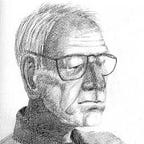Flaneuring
I love this word. It is so European and cultured even in its Americanized version. For me it means exercise and thinking.
Flâneur (pronounced [flɑnœʁ]), from the French noun flâneur, means “stroller”, “lounger”, “saunterer”, or “loafer”. Flânerie is the act of strolling, with all of its accompanying associations. (Courtesy of Wikipedia)
This word has become a favorite in my mental dictionary. It suits both hobbies of aimlessly walking and biking. It first came to my attention reading The Art of Wandering by Martin Coverley. Now it is firmly rooted, especially while aimlessly beach walking. Most people walk along the beach close to the water’s edge where the wetted sand feels more like concrete. My preference is much softer sand far from the water where it is more difficult to walk and therefore better for exercising joints, muscles, and tendons. After many rain-less days you literally sink into the sand. It conjures up visions of my ancestors 60,000 years ago trudging up and down sand dunes on their way out of Africa — flaneuring encourages very expansive thinking.
When possible I follow car and truck tire tracks because they leave ridges that make me sink into the sand even more like off the crest of a miniature sand dune. Lately, in addition to tracks left by garbage trucks emptying trash receptacles, there have been police SUVs patrolling the beaches and military helicopters flying overhead. They must think caravans of Mexicans are swimming across the Gulf of Mexico. But I delight in the ridges left behind by their tires.
Occasionally I stop a policeman on the beach and ask whether they could find me if I called the 9–1–1 dispatcher and gave my smartphone’s location in degrees of latitude and longitude instead of a street number or nearest cross street? Mostly they answer “Yes.” But a few hesitate over the unfamiliar latitude-longitude reference. This search n’ rescue question is always with me on bike trails that do not run along streets or on lonely beaches still within reach of cell towers. In my summer nesting grounds, Bavaria, and all over Europe, the go-to-number in an emergency is 1–1–2. I will continue to ask the polizei the same question as I often ride bike trails through corn fields with no house numbers or cross streets in sight.
Thinking while flaneuring is not always blissful along the waterfront. Occasionally you encounter death as in a several hundred pound sea turtle that washed ashore not from old age but some environmental hazard like swallowing a plastic bag, or getting tangled in fishing line, or wounded in a collision with a boat.
My starboard boat neighbor in the marina recently passed away. His boat is called Destiny. Our two boats are separated by a meter-wide finger pier. We frequently greeted each other with “Hellos” and idle boat chatter about the tides and the mooring lines. He was a Gung-ho U.S. Marine Corps veteran. Then one day I helped him off the boat for a trip to a Veteran’s hospice service. He gave me one of his favorite U.S. Marine Corps T-shirts from his time in Germany and I never saw him again.
His boat was quickly purchased and I now have new neighbors with pre-teen children and grandparents and a whole new destiny to ponder while flaneuring. The four and eight-year-old were sitting in the cockpit while the parents puttered around the boat. Then a few days later I saw the mother of the two children and her mother scrubbing the deck. An unusual and welcomed sight at any marina where men are the predominant owners, users, and cleaners of boats.
So much to think about while flaneuring.
